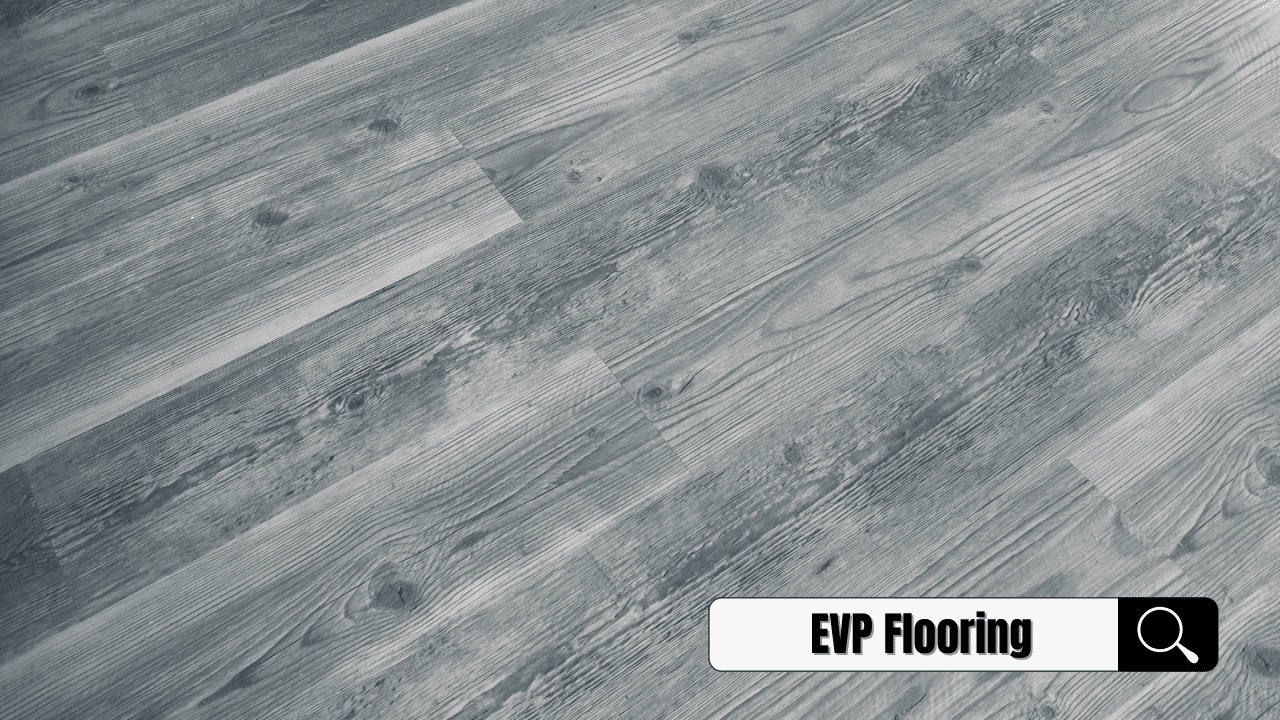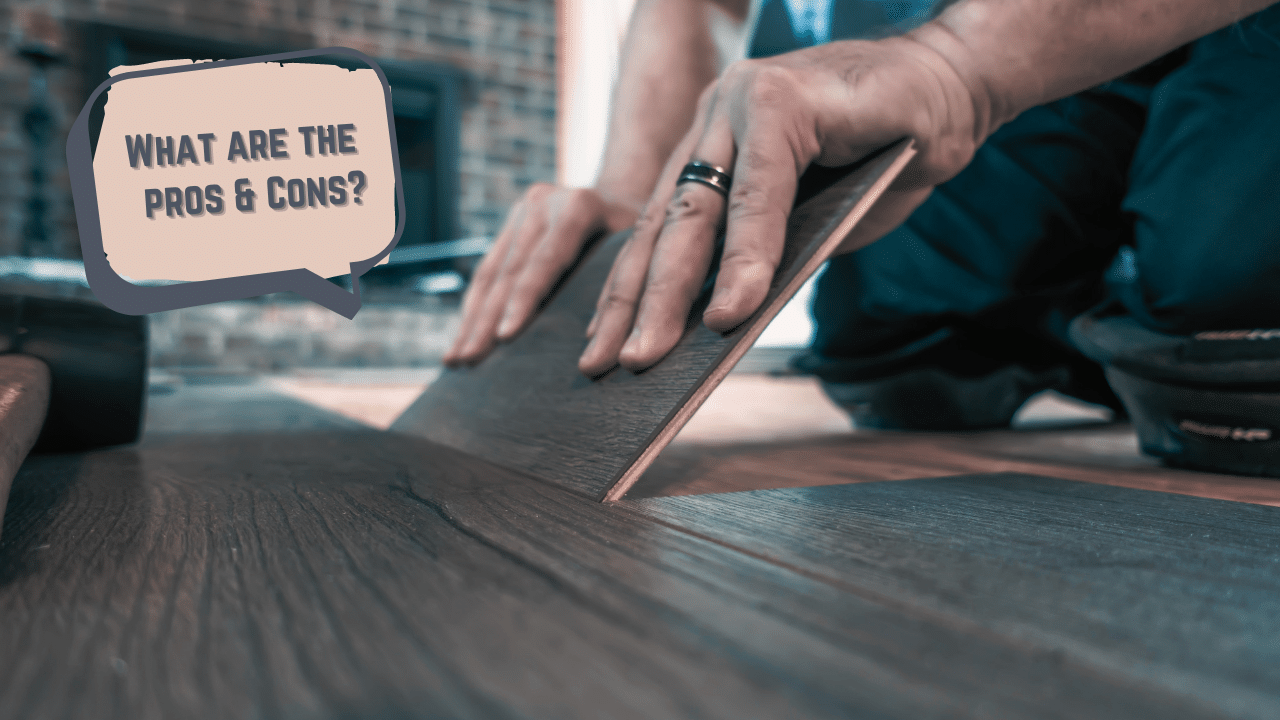If you’re looking for the best vinyl plank flooring options for your next home improvement project– you may have stumbled across the term “EVP flooring” by now.
With so many acronyms associated with vinyl floorings such as LVT, WPC, and SPC, how is Engineered Vinyl Plank flooring different from the regular vinyl tiles?
To put it simply, EVP is one vinyl flooring type that is designed with a unique core construction, making it more stable. This flooring is also known as rigid core vinyl flooring and is the preferred vinyl type for commercial use.
To make it less of a riddle, we’re here to discuss what EVP flooring is, its pros and cons, and associated costs to help prepare your budget.
What is EVP Flooring?
EVP stands for Engineered Vinyl Plank, and this type of flooring is also known as rigid-core luxury vinyl plank flooring.
It is famous for striking a balance between the stunning natural appearance of stone and wood floors, although less vulnerable to moisture problems and visible scratches. Accordingly, the design layer of EVP floors can be customized to mimic the texture of other flooring types. (Related: EVP and LVP: Which Vinyl Plank is Right for Your Project?)
EVP Flooring Costs
On average, you will pay around $4 to $7 per sq/ft for good-quality EVP flooring. Plenty of cost-effective options range from $2 per square meter, but keep in mind that these products may be more susceptible to damage.
In contrast, premium EVP tiles may cost you up to $10 per square meter. These are designed with excellent quality padding at the base, with a thick wear layer at the surface.
Two primary factors may influence the price of EVP tiles: core type and styling. When it comes to the type of core, SPC core ($4 to $7 per sq/ft) will cost you more than WPC core ($3 to $6 per sq/ft).
Meanwhile, prepare to pay $14 or more per sq/ft in choosing premium grade EVP tiles such as herringbone and geometric patterns. Basic EVP flooring with marble, stone, or slate designs only costs half as much.
Two Types of EVP Flooring Core
For your reference, there are two main types of EVP flooring core.
1
Wood Polymer Composite (WPC) - WPC EVP is built with a wood core, which gives excellent heat insulation and soundproofing features. As protection against moisture, it is often enclosed with vinyl.
2
Stone Polymer Composite (SPC) - SPC EVP has a limestone core, making it more rigid yet thinner and sleeker. It is an excellent choice for areas with consistent heavy foot traffic.
Pros and Cons of EVP Flooring
EVP flooring has long since been renowned for its hardwood mimicking abilities. Not to mention, it also omits the drawbacks of traditional bamboo, hickory, or marble flooring.
It does not say that you can only expect advantages with EVP floors. There will always be some downsides to any choice you make, even in your new flooring.
Let’s discuss all the pros and cons of EVP flooring to determine if this is the right choice for your needs.
Pros:
Relatively Affordable Price - We love EVP flooring's remarkably affordable price, ranging between $4 and $6 per square foot. It is undoubtedly one affordable flooring option without sacrificing quality. Additionally, you won’t need to shell out extra cash on a frequent replacement as this material is known for its durability and strength. This helps you save extra money in the long run.
Durable - With its hard plastic topcoat and wear layer, EVP flooring is one of the most durable options to consider in today’s market. You can choose the SPC type if you prioritize having durable floors since its limestone core is famed for strength. Think of it as faux wood floors that are good for heavy use.
Waterproof (Moisture-Resistant) - Premium EVP brands offer 100% waterproof flooring material. That said, moisture won’t be able to seep into the subfloors and compromise their structural integrity. Some homeowners even opt to use EVP flooring for outdoor use.
Versatile - You’re free to install EVP flooring over most subfloor types, as long as it is even/level. Its decorative layer may also be finished to your liking, making it easier for you to blend it with your interior decors. Some manufacturers also offer embossed texture EVP tiles, making them look more natural.
Available in Several Wood and Stone-Look Options - Nowadays, you don’t need to break the bank when installing beautiful stone or wood floors in your home. There’s an EVP tile that’s a carbon copy of your favorite wood flooring designs or tile patterns. You just need to know where to look for the high-quality ones.
Easy Installation - Although EVP material is heavier than its LVP counterpart, you can still expect an easy installation process. It doesn’t need acclimation, and you can begin the installation as soon as you purchase at your local store. Moreover, most EVP planks also have a tongue-and-groove locking, making it easier for DIYers to do the installation by themselves.
Low Maintenance - EVP flooring also has low maintenance. Even if you only do the occasional cleaning, your floors will still look their prime. Better yet, do simple sweeping or cleaning with a wet mop. Stray away from vacuums with rotating brushes as it may only damage the wear layer. Harsh cleaning agents may damage the vinyl floors, so it’s ideal for you to keep it simple. The transparent wear layer effectively conceals any visible marks and scratches. So even if it can’t be refinished, this flooring type does not need it at all.
Soundproofing Features - Since EVP flooring has a dense, rigid core of limestone composite or wood– it provides excellent soundproofing features. Enjoy the virtually quiet thump as you walk on your new flooring.
Not an Eco-Friendly Option - Generally, vinyl plank flooring isn’t the most eco-friendly option in the market. If you want to choose green materials for your home, you may want to consider other sustainable wood flooring choices instead. Do note that this may require you to spend some extra cash, though.
May Fade from Sun Exposure - Many standard flooring materials fade when constantly exposed to direct sunlight. If not fading, discoloration will be an issue. The best way to avoid this problem is to check the specifications issued by your local manufacturer. Avoid installing EVP flooring in rooms with large skylight windows. EVP flooring materials include a UV-resistant wear layer, but discoloration from constant sunlight exposure may still be possible.
Can’t Refinish Damaged EVP Flooring - Suppose you end up damaging your tile plank. The sad news is– refinishing it is not an option. If you want to fix it, you may need to replace the plank entirely. This is considered a disadvantage if you compare vinyl to other flooring types, which can be refinished easily. Don’t worry; EVP is naturally durable. It will take quite an impact for it to be compromised in any way.
May Emit VOCs - VOCs, or Volatile Organic Compounds, are known to put your health at risk. Cheap EVP flooring materials may emit VOCs, leading to different health issues. If you want safe EVP flooring material for your home, find a manufacturer that can ensure low VOC ratings. Note that some budget-friendly options may not be considered as low-VOC flooring. That said, you may want to browse non-toxic laminate flooring material to prioritize your health and well-being. Bonus: stray away from buying recycled EVP content. These may have high VOC content as it is often difficult to regulate.


